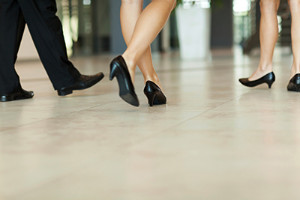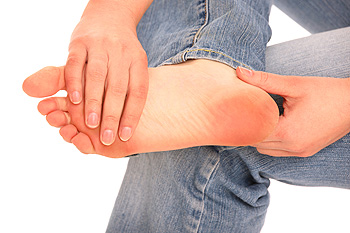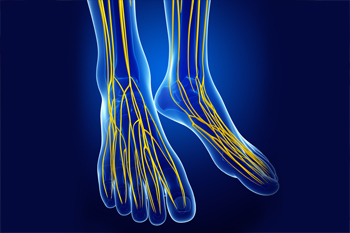
 Swollen feet is a common ailment many pregnant women are familiar with. It typically occurs as a result of pressure that is caused by the fetus, and warmer temperatures may also play a significant role. Many pregnant women who tend to stand for the majority of the day may experience pain, discomfort, and swelling in the feet and ankles. Moderate relief may be found by elevating the feet at the end of the day, wearing shoes that are comfortable, and by regularly drinking plenty of water. Research has indicated that performing gentle stretches may decrease a portion of the swelling. An effective stretch can consist of circulating the ankle several times, followed by changing directions. If you have questions about how to reduce swelling in your feet while being pregnant, please consult with a podiatrist.
Swollen feet is a common ailment many pregnant women are familiar with. It typically occurs as a result of pressure that is caused by the fetus, and warmer temperatures may also play a significant role. Many pregnant women who tend to stand for the majority of the day may experience pain, discomfort, and swelling in the feet and ankles. Moderate relief may be found by elevating the feet at the end of the day, wearing shoes that are comfortable, and by regularly drinking plenty of water. Research has indicated that performing gentle stretches may decrease a portion of the swelling. An effective stretch can consist of circulating the ankle several times, followed by changing directions. If you have questions about how to reduce swelling in your feet while being pregnant, please consult with a podiatrist.
Pregnant women with swollen feet can be treated with a variety of different methods that are readily available. For more information about other cures for swollen feet during pregnancy, consult with Dr. Harris L. Klear from Burlington County Podiatry Associates. Our doctor will attend to all of your foot and ankle needs.
What Foot Problems Can Arise During Pregnancy?
One problem that can occur is overpronation, which occurs when the arch of the foot flattens and tends to roll inward. This can cause pain and discomfort in your heels while you’re walking or even just standing up, trying to support your baby.
Another problem is edema, or swelling in the extremities. This often affects the feet during pregnancy but tends to occur in the later stages.
How Can I Keep My Feet Healthy During Pregnancy?
If you have any questions please feel free to contact one of our offices located in Marlton and Delran, NJ . We offer the newest diagnostic and treatment technologies for all your foot and ankle needs.
 The feet will feel better when the correct shoes are worn for the type of job that is performed on a daily basis. If wearing high heels is a requirement for a job, it may be beneficial to wear comfortable shoes on the way to and from your place of employment. Research has indicated that when the right shoes are worn while at work, accidents may be prevented. If you stand or walk for the majority of the work day, it may help to wear shoes that have laces which can keep the feet stable. If you work in a wet environment, shoes that are slip resistant and waterproof may help to prevent falling. If you would like additional information about what type of shoes should be worn for a particular job, it is suggested that you speak to a podiatrist.
The feet will feel better when the correct shoes are worn for the type of job that is performed on a daily basis. If wearing high heels is a requirement for a job, it may be beneficial to wear comfortable shoes on the way to and from your place of employment. Research has indicated that when the right shoes are worn while at work, accidents may be prevented. If you stand or walk for the majority of the work day, it may help to wear shoes that have laces which can keep the feet stable. If you work in a wet environment, shoes that are slip resistant and waterproof may help to prevent falling. If you would like additional information about what type of shoes should be worn for a particular job, it is suggested that you speak to a podiatrist.
While working on the feet, it is important to take the proper care of them. For more information about working on your feet, contact Dr. Harris L. Klear from Burlington County Podiatry Associates. Our doctor will treat your foot and ankle needs.
Working on Your Feet
Standing on your feet for long periods of time can cause stress and pain in your feet. Your whole body may experience change in terms of posture, back pain, bunions, callouses and or plantar warts. There are ways to avoid these conditions with proper foot care, smart choices and correct posture.
Positive Changes
Negative heeled shoe – Choosing this shoe type places the heel slightly lower than the ball of the foot. These are great for overall foot health. Find shoes that fit you correctly.
Go barefoot – Our feet were not designed to be enclosed for all hours of the day. Try to periodically expose your feet to air.
Eliminate Pain
Foot Exercises – Performing simple exercises, incorporating yoga and doing stretches are beneficial. This will allow increased blood flow to the area and muscles of the foot.
Achilles tendon – Stretching the foot out flat on the floor will relax the calf muscles and tendon. These exercises can be performed almost anywhere. Make sure you add these exercises to your daily regimen.
With a little bit of this information and knowing more about foot health, you will notice changes. Foot stretches and proper footwear will help with pain and prevent further issues.
If you have any questions please feel free to contact one of our offices located in Marlton and Delran, NJ . We offer the newest diagnostic and treatment technologies for all your foot and ankle needs.
 Each foot consists of several bones, ligaments, muscles, and tendons, and is considered to be one of the most complex parts of the body. When foot pain occurs, it may be a result of improper foot function that can be caused for a variety of reasons. These can consist of wearing shoes that do not fit properly, which can affect the mechanics of the feet. Additionally, genetic factors may play a significant role in existing foot pain. Heel pain can be indicative of a condition that is known as heel spurs. It is defined as a bony growth that develops underneath the heel and can cause pain and discomfort. A bunion will typically form on the bottom of the big toe and appears as a large growth. Another form of foot pain can be the result of an ankle sprain, which may occur from falling, or from stepping off of a curb unexpectedly. If you are experiencing any type of foot pain, it is suggested that you speak to a podiatrist who can properly treat any foot conditions.
Each foot consists of several bones, ligaments, muscles, and tendons, and is considered to be one of the most complex parts of the body. When foot pain occurs, it may be a result of improper foot function that can be caused for a variety of reasons. These can consist of wearing shoes that do not fit properly, which can affect the mechanics of the feet. Additionally, genetic factors may play a significant role in existing foot pain. Heel pain can be indicative of a condition that is known as heel spurs. It is defined as a bony growth that develops underneath the heel and can cause pain and discomfort. A bunion will typically form on the bottom of the big toe and appears as a large growth. Another form of foot pain can be the result of an ankle sprain, which may occur from falling, or from stepping off of a curb unexpectedly. If you are experiencing any type of foot pain, it is suggested that you speak to a podiatrist who can properly treat any foot conditions.
Foot Pain
Foot pain can be extremely painful and debilitating. If you have a foot pain, consult with Dr. Harris L. Klear from Burlington County Podiatry Associates. Our doctor will assess your condition and provide you with quality foot and ankle treatment.
Causes
Foot pain is a very broad condition that could be caused by one or more ailments. The most common include:
Diagnosis
To figure out the cause of foot pain, podiatrists utilize several different methods. This can range from simple visual inspections and sensation tests to X-rays and MRI scans. Prior medical history, family medical history, and any recent physical traumatic events will all be taken into consideration for a proper diagnosis.
Treatment
Treatment depends upon the cause of the foot pain. Whether it is resting, staying off the foot, or having surgery; podiatrists have a number of treatment options available for foot pain.
If you have any questions, please feel free to contact one of our offices located in Marlton and Delran, NJ . We offer the newest diagnostic and treatment technologies for all your foot care needs.
 Research has indicated that if you have poor circulation in your feet, it may be indicative of other medical conditions. These may include diabetes, heart conditions, and obesity. It is defined as restricted blood flow to the lower extremities, and there are often noticeable symptoms that are associated with this condition. These can consist of numbness, tingling, and muscle cramps, in addition to pain and discomfort. Nerve damage can possibly be caused by poor circulation, in addition to varicose veins and blood clots. Patients may find relief when specific exercises are performed, and compression stockings are worn that are designed for painful, swollen legs. If you feel you have symptoms of this condition, it is advised that you consult with a podiatrist to learn about the best treatment options for you.
Research has indicated that if you have poor circulation in your feet, it may be indicative of other medical conditions. These may include diabetes, heart conditions, and obesity. It is defined as restricted blood flow to the lower extremities, and there are often noticeable symptoms that are associated with this condition. These can consist of numbness, tingling, and muscle cramps, in addition to pain and discomfort. Nerve damage can possibly be caused by poor circulation, in addition to varicose veins and blood clots. Patients may find relief when specific exercises are performed, and compression stockings are worn that are designed for painful, swollen legs. If you feel you have symptoms of this condition, it is advised that you consult with a podiatrist to learn about the best treatment options for you.
While poor circulation itself isn’t a condition; it is a symptom of another underlying health condition you may have. If you have any concerns with poor circulation in your feet contact Dr. Harris L. Klear of Burlington County Podiatry Associates. Our doctor will treat your foot and ankle needs.
Poor Circulation in the Feet
Peripheral artery disease (PAD) can potentially lead to poor circulation in the lower extremities. PAD is a condition that causes the blood vessels and arteries to narrow. In a linked condition called atherosclerosis, the arteries stiffen up due to a buildup of plaque in the arteries and blood vessels. These two conditions can cause a decrease in the amount of blood that flows to your extremities, therefore resulting in pain.
Symptoms
Some of the most common symptoms of poor circulation are:
Treatment for poor circulation often depends on the underlying condition that causes it. Methods for treatment may include insulin for diabetes, special exercise programs, surgery for varicose veins, or compression socks for swollen legs.
As always, see a podiatrist as he or she will assist in finding a regimen that suits you. A podiatrist can also prescribe you any needed medication.
If you have any questions, please feel free to contact one of our offices located in Marlton and Delran, NJ. We offer the newest diagnostic and treatment technologies for all your foot care needs.
Read more about Causes Symptoms and Treatment for Poor Circulation in the Feet Research has indicated that if you have poor circulation in your feet, it may be indicative of other medical conditions. These may include diabetes, heart conditions, and obesity. It is defined as restricted blood flow to the lower extremities, and there are often noticeable symptoms that are associated with this condition. These can consist of numbness, tingling, and muscle cramps, in addition to pain and discomfort. Nerve damage can possibly be caused by poor circulation, in addition to varicose veins and blood clots. Patients may find relief when specific exercises are performed, and compression stockings are worn that are designed for painful, swollen legs. If you feel you have symptoms of this condition, it is advised that you consult with a podiatrist to learn about the best treatment options for you.
Research has indicated that if you have poor circulation in your feet, it may be indicative of other medical conditions. These may include diabetes, heart conditions, and obesity. It is defined as restricted blood flow to the lower extremities, and there are often noticeable symptoms that are associated with this condition. These can consist of numbness, tingling, and muscle cramps, in addition to pain and discomfort. Nerve damage can possibly be caused by poor circulation, in addition to varicose veins and blood clots. Patients may find relief when specific exercises are performed, and compression stockings are worn that are designed for painful, swollen legs. If you feel you have symptoms of this condition, it is advised that you consult with a podiatrist to learn about the best treatment options for you.
While poor circulation itself isn’t a condition; it is a symptom of another underlying health condition you may have. If you have any concerns with poor circulation in your feet contact Dr. Harris L. Klear of Burlington County Podiatry Associates. Our doctor will treat your foot and ankle needs.
Poor Circulation in the Feet
Peripheral artery disease (PAD) can potentially lead to poor circulation in the lower extremities. PAD is a condition that causes the blood vessels and arteries to narrow. In a linked condition called atherosclerosis, the arteries stiffen up due to a buildup of plaque in the arteries and blood vessels. These two conditions can cause a decrease in the amount of blood that flows to your extremities, therefore resulting in pain.
Symptoms
Some of the most common symptoms of poor circulation are:
Treatment for poor circulation often depends on the underlying condition that causes it. Methods for treatment may include insulin for diabetes, special exercise programs, surgery for varicose veins, or compression socks for swollen legs.
As always, see a podiatrist as he or she will assist in finding a regimen that suits you. A podiatrist can also prescribe you any needed medication.
If you have any questions, please feel free to contact one of our offices located in Marlton and Delran, NJ . We offer the newest diagnostic and treatment technologies for all your foot care needs.